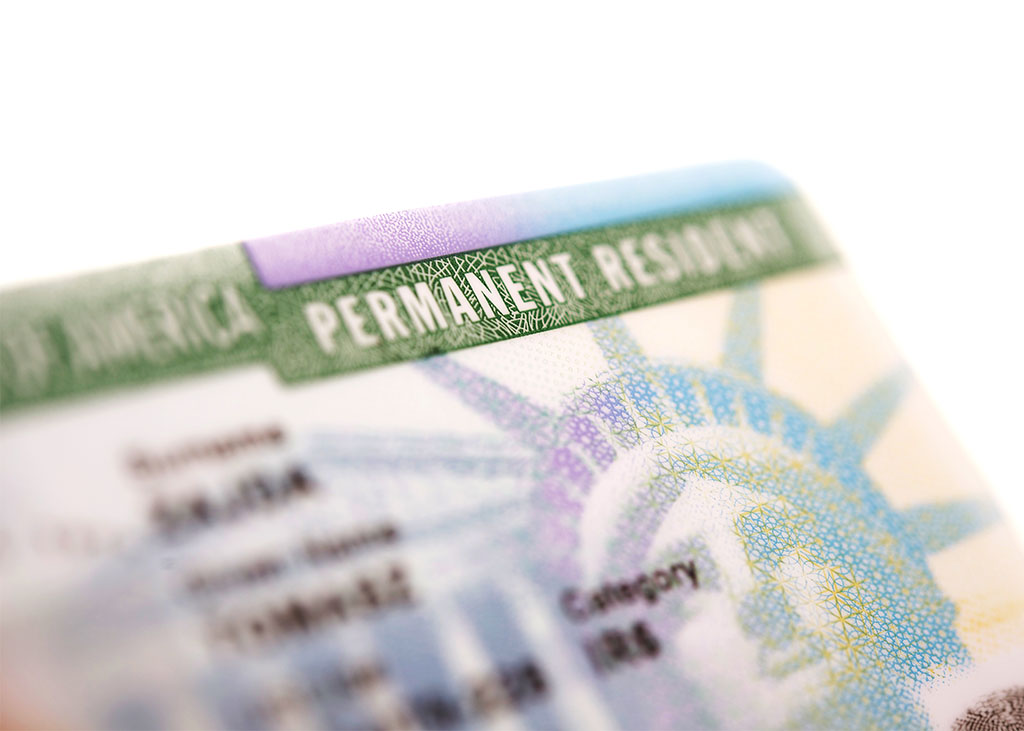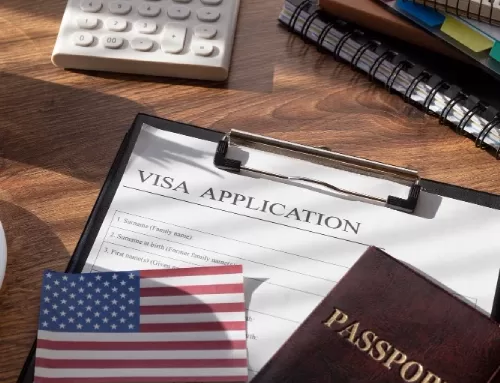Within the United States (U.S.), acquisition of a green card is the key to permanent residence. The correct legal term for a green card holder is “lawful permanent resident” or LPR. When someone holds LPR status, with patience and practice they can eventually become a naturalized U.S. citizen. Because green cards are a key to lawful and permanent residence in America, many people wish to apply for them. But there are strict rules and regulations regarding who is eligible for a green card. And if even if a person is eligible, the application can be long and arduous, though obviously worth it should the final outcome be positive.
In this article, we will review some basic facts about green cards in the U.S. You’ll also learn about standard green card eligibility categories, sponsorship, and bars to adjustment.
The Importance Of A Green Card Lawyer
Most importantly, if you are seeking a green card for yourself or a loved one, you should consult an expert immigration attorney. The application process is both detailed and complicated, and unintended errors can mean either delay or lead to the denial of your petition. Lawyers know the “ins and outs” of the application process and can help avoid such setbacks. Talk with an attorney at Davis & Associates today for a free initial consultation to discuss your green card needs.
About Green Cards
Green cards originated shortly after World War II, and have continued to be a bastion of legal immigration to the present day. Interestingly, the green card has not always been green! Also, many are surprised to learn that the green card is not accessible to various groups of immigrants, and it can be difficult to gain one.
Green cards are not visas. In fact, they confer lawful permanent resident status. This status allows a person to confidently begin to build a life, career, and family on U.S. soil. Eventually, a green card holder can apply to become a naturalized U.S. citizen.
Eligibility categories for green cards are discussed below.
The USCIS lists all green card eligibility categories on its website. You can read the information in its entirety here. In order to be eligible to apply for consideration for a green card, you or a loved one should fit into one of these categories. If you aren’t quite sure which category may apply, or if there’s another option, the best person to help is an experienced immigration attorney. Below we list the specific green card eligibility categories found on the USCIS’s website.
Green Card Eligibility Categories
• Family
• Employment
• Special Immigrant Status
• Refugee or Asylee Status
• Human Trafficking or Crime Victims
• Victims of Abuse
• Other Categories
• Through Registry
Some of the above eligibility categories are obvious. For example, anyone applying for a “green card through family,” should have a sponsor that is an immediate family member. Yet, other categories, like “Green Card through Other Categories” may be more confusing. For your benefit, we briefly describe each category below.
Green Card Through Family
A person may be eligible to apply for a green card through family if they are the immediate relative of a U.S. citizen or lawful permanent resident (LPR), a fiancé(e) of a U.S. citizen, a widow(er) of a U.S. citizen, or an abused relative of a U.S. citizen or LPR.
The USCIS defines “immediate relative” as any spouses, unmarried children under 21, and parents over the age of 21. Other relatives, such as adult or married children and siblings, may also be eligible, but will likely receive lower priority. This simply means that some familial relations will receive quicker and broader access when the USCIS considers awarding green cards. The USCIS discusses family-based preference categories in full detail on its website.
Green Card Through Employment
You can acquire a green card as an immigrant worker. But first priority for these green cards is available to a very specific group of foreign professionals. According to the USCIS, first preference “priority workers” are those with “extraordinary ability in the sciences, art, education, business, or athletics,” as well as “outstanding professors or researchers” and “certain multinational managers and executives.” Obviously, other classes of immigrant professionals exist but receive lower preference.
Other people who can acquire a green card via employment means are certain classes of physicians and immigrant investors. You can read more on the USCIS’s eligibility categories page, linked earlier in this article.
Green Card As A Special Immigrant
The USCIS considers certain special immigrants when allocating green cards. These include certain religious workers, special immigrant juveniles who have suffered abuse, international broadcasters, and members of select international organizations like NATO.
Green Card Through Refugee Or Asylee Status
Obviously, anyone applying for a green card via this eligibility category must already have been awarded either refugee or asylee status. Foreign nationals receive these statuses through special consideration processes that often involve in-depth and complicated applications and interviews. In both instances, asylees and refugees can apply to become lawful permanent residents after 1 year of relevant status.
Green Card For Human Trafficking And Crime Victims
This very special category of green cards are only available to those who are already in possession of specific nonimmigrant visas. For human trafficking victims, this is a T nonimmigrant visa, and for crime victims, a U nonimmigrant visa.
Green Card For Victims Of Abuse
Some victims of abuse may be eligible for a green card. These include VAWA self-petitioners, who are also eligible via the “family” category. VAWA self-petitioners are the abused immediate family members (spouses, parents, children) of U.S. citizens, and in some cases, lawful permanent residents. Another group of immigrants eligible under this category is “special immigrant juveniles.” According to the USCIS, these juveniles have been abused and abandoned and assigned this status via the U.S. court system. Other victims of abuse qualifying under certain government acts, like the Cuban Adjustment Act, may also be eligible.
Green Card Through Other Categories
This section compromises all various foreign nationals who may be eligible to apply for a green card but do not fit any other category. One notable group within this category are those who receive diversity visas. Diversity visas are awarded via the Diversity Visa Lottery Program, and provide a path to a permanent life in the U.S. for those who otherwise have no way to apply. A total of 50,000 diversity visas are made available each year via lottery.
There are several other types of immigrants eligible for green cards under this category. Therefore, you can read more on the USCIS’s website.
Green Card Through Registry
A unique category, some people who have “been present in the United States since January 1, 1972” may be eligible for a green card. According to the USCIS, to apply via this category, the candidate must:
• Have lived continuously in the U.S. since January 1972;
• Be of upstanding moral character;
• Be eligible for naturalization; and
• Not be deportable or inadmissible or hold any bars to adjustment.
Sponsorship
When someone applies for a green card via certain eligibility categories, they must have a sponsor. For example, a sponsor can be a family member or employer. Sponsors must submit specific paperwork to the relevant authorities, effectively petitioning for the applicant. We wrote in-depth about green card sponsorship here.
A sponsor may need to submit an Affidavit of Support, accepting financial responsibility for the petitioner. The best way to prepare to be a sponsor is to talk with an immigration attorney with experience in green card applications.
Bars To Adjustment
As with any U.S. immigration process, it is not easy to become a lawful permanent resident. Green card holders undergo rigorous screening and application processes, and there are several reasons that someone may be ineligible to apply. These are called “bars to adjustment.” According to the USCIS, bars to adjustment are listed in the Immigration and Nationality Act (INA). If one or more of the bars to adjustment listed in the INA applies to a candidate, they are likely ineligible to become a lawful permanent resident.
Some examples of bars to adjustment include:
• Criminal convictions within the U.S. or abroad;
• Previous terroristic ties or activities;
• Violation of visa terms or restrictions; and/or
• Engagement in unauthorized employment.
Other bars to adjustment exist and you can read about them on the USCIS’s website. If you think that you may be ineligible to apply for a green card due to such reasons, it is essential to consult an immigration attorney. You may have options.
Ready To Apply? Talk To An Expert Green Card Lawyer
Acquisition of a green card is, quite literally, the gateway to building a permanent life in America. Once you are a lawful permanent resident, you begin your journey on the pathway to naturalization and U.S. citizenship, should that be your goal. But the application and sponsorship process for green cards can be complicated and difficult to navigate. Ultimately, the best way to know if you are truly eligible for a green card is to talk to an immigration lawyer.
An experienced lawyer with a deep understanding of the green card application process will help you in many ways. First, they’ll help you avoid application errors or omissions, which can lead to unnecessary delays or denials. Also, lawyers can help you should any issues, questions, or problems arise during your application. The passionate attorney Hector Rivera Jr serves clients in West Palm Beach area, and across Florida. There’s no need to navigate the green card application process alone – we can help. Contact us today to set up an initial consultation. We will review your case, let you know your options, and provide a path forward.







Leave A Comment
You must be logged in to post a comment.